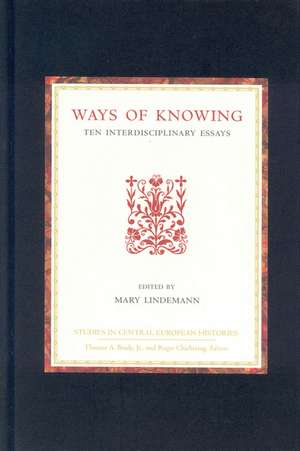Ways of Knowing: Ten Interdisciplinary Essays
Editat de Mary Lindemannen Limba Engleză Hardback – 14 apr 2004
Contributors include: Robert Beachy, Susan R. Boettcher, Jason Coy, Pia F. Cuneo, Mitchell Lewis Hammond, Mary Lindemann, Francisca Loetz, Terence McIntosh, Janice L. Neri, Elisabeth Wåghäll Nivre, and Helen Watanabe-O’Kelly.
Preț: 675.86 lei
Preț vechi: 824.23 lei
-18% Nou
Puncte Express: 1014
Preț estimativ în valută:
129.34€ • 135.20$ • 109.29£
129.34€ • 135.20$ • 109.29£
Carte indisponibilă temporar
Doresc să fiu notificat când acest titlu va fi disponibil:
Se trimite...
Preluare comenzi: 021 569.72.76
Specificații
ISBN-13: 9780391041844
ISBN-10: 0391041843
Pagini: 210
Dimensiuni: 162 x 236 x 24 mm
Greutate: 0.53 kg
Ediția:New.
Editura: Brill
Colecția Brill
ISBN-10: 0391041843
Pagini: 210
Dimensiuni: 162 x 236 x 24 mm
Greutate: 0.53 kg
Ediția:New.
Editura: Brill
Colecția Brill
Public țintă
The interdisciplinary character of this volume, bridging and blending persepctives from several disciplines, should interest all scholars and students of the early modern period.Cuprins
Acknowledgements
List of Illustrations
Contributors
Introduction: Ways of Knowing, Mary Lindemann
Part I. Creating and Organizing Knowledge
1. Mad Mares and Wilful Women: Ways of Knowing Nature—and Gender—in Early Modern Hippological Texts, Pia F. Cuneo
2. From Insect to Icon: Joris Hoefnagel and the ‘Screened Objects’ of the Natural World, Janice L. Neri
3. The Management of Knowledge at the Electoral Court of Saxony in Dresden, Helen Watanabe-O’Kelly
4. Facts or Fiction: Reading and Writing in Early Modern Popular Literature, Elisabeth Wåghäll Nivre
Part II. Evaluating and Using Knowledge
5. Are the Cranach Luther Altarpieces Philippist? Memory of Luther and Knowledge of the Past in the Late Reformation, Susan R. Boettcher
6. Medicine and Pastoral Care for the Dying in Protestant Germany, Mitchell Lewis Hammond
7. How to Do Things with God: Blasphemy in Early Modern Switzerland, Francisca Loetz
8. “Our Diligent Watchers and Informers”: Official Surveillance, Private Denunciation, and the Limits of Authority in Sixteenth-Century Ulm, Jason Coy
9. The Eclipse of Usury: Bankruptcy and Business Morality in Eighteenth-Century Germany, Robert Beachy
10. Public Church Penance in Saxony, Terence McIntosh
Index
List of Illustrations
Contributors
Introduction: Ways of Knowing, Mary Lindemann
Part I. Creating and Organizing Knowledge
1. Mad Mares and Wilful Women: Ways of Knowing Nature—and Gender—in Early Modern Hippological Texts, Pia F. Cuneo
2. From Insect to Icon: Joris Hoefnagel and the ‘Screened Objects’ of the Natural World, Janice L. Neri
3. The Management of Knowledge at the Electoral Court of Saxony in Dresden, Helen Watanabe-O’Kelly
4. Facts or Fiction: Reading and Writing in Early Modern Popular Literature, Elisabeth Wåghäll Nivre
Part II. Evaluating and Using Knowledge
5. Are the Cranach Luther Altarpieces Philippist? Memory of Luther and Knowledge of the Past in the Late Reformation, Susan R. Boettcher
6. Medicine and Pastoral Care for the Dying in Protestant Germany, Mitchell Lewis Hammond
7. How to Do Things with God: Blasphemy in Early Modern Switzerland, Francisca Loetz
8. “Our Diligent Watchers and Informers”: Official Surveillance, Private Denunciation, and the Limits of Authority in Sixteenth-Century Ulm, Jason Coy
9. The Eclipse of Usury: Bankruptcy and Business Morality in Eighteenth-Century Germany, Robert Beachy
10. Public Church Penance in Saxony, Terence McIntosh
Index
Notă biografică
Mary Lindemann is Professor of History at Carnegie Mellon University. She is the author of Patriots and Paupers: Hamburg, 1712-1830 (Oxford University Press, 1990); Health and Healing in Eighteenth-Century Germany (Johns Hopkins University Press); and Medicine and Society in Early Modern Europe (Cambridge University Press).
Recenzii
"Lest one think there is a hardly discernable theme, Mary Lindemann does a fine job of introducing the scope of the work as a collection of papers that explore questions of what constituted knowledge in the context of early modern Germany and how knowledge was gathered, assembled, organized, deployed and interpreted. The title, Ways of Knowing, works as a two-sided title as the book explores the interdisciplinary questions of how historians know the past and how our early modern subjects sought to understand their own world. (…)
This collection, as part of Brill's Studies in Central European Histories, is presented in an attractive manner with a cloth binding and a substantial number of illustrations that serve to both enhance and instruct. Ultimately this work is a curious, fascinating, and penetrating approach to both the genre of conference proceedings and the two-sided approach to interdisciplinary ways of knowing."
Daniel van Voorhis, St. Andrews Reformation Studies Institute, Sixteenth Century Journal
This collection, as part of Brill's Studies in Central European Histories, is presented in an attractive manner with a cloth binding and a substantial number of illustrations that serve to both enhance and instruct. Ultimately this work is a curious, fascinating, and penetrating approach to both the genre of conference proceedings and the two-sided approach to interdisciplinary ways of knowing."
Daniel van Voorhis, St. Andrews Reformation Studies Institute, Sixteenth Century Journal
